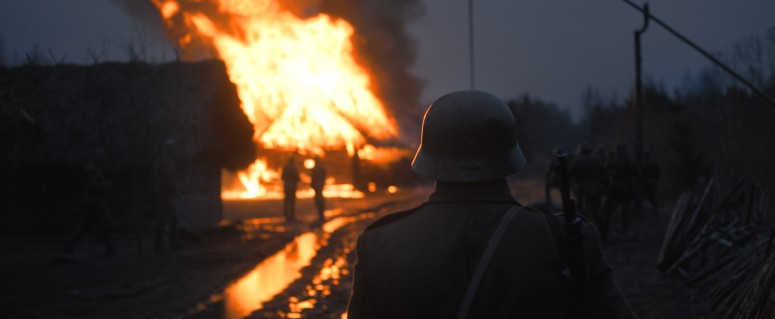Anna Ainio reviews this drama set in World War II that tells the story of a Hungarian farmer working for the Soviet army.
Floating on a wooden ship on the river, two hunters are bringing home their trophy: an enormous dead elk. They are stopped by Hungarian soldiers who shoot at them from the river shores, before stealing their booty and cutting the frozen animal’s meat with an axe. This scene takes place in the cold-light of Hungarian woods. The hunters and the soldiers exchange just a few words, as the most eloquent element in the scene is the dead carcass: it stands for the misery of the people whose region of the former Soviet Union was occupied by the soldiers. This harsh scene is a prelude for the rest of Denes Nagy’s film, which is both a dry, honest recount of a fragment of the Second World War and a slow, introspective story about military occupation and misery.
The film’s main character, Semetka (Ferenc Szabo), is a reluctant soldier of the Hungarian cohort occupying an indistinct region of the Soviet Union. Hungarians are German allies, and they are looking for hidden partisans in the village. This war story, based on a homonym novel by Pal Zavada, is told from the perspective of the occupiers and, to a certain extent, of the occupied too: Semetka himself is divided between the role he embodies in his uniform and his empathy for the villagers. ‘Go away! There’s nothing for you here, you already took everything’, a man shouts at Semetka and his fellow-soldier in the woods. Unlike his abusive companions, Semetka perceives his military duty as a burden; and when he finds out about some pilfered cheese, he doesn’t report anything to his superiors. And when he finds out about some pilfered cheese, he doesn’t report anything to his superiors. However, as a well-rounded and realistic character, he is also complicit in their oppression of the locals. When, after an ambush, his commander-in-chief dies and he takes on the unit’s lead, he decides to enclose all the village’s inhabitants in a barn. His actions will have – perhaps unexpected – consequences when Matyas Koleszár, the newly-arrived leader, doesn’t show as much sympathy for the villagers.

There’s something inorganic about this film, a stone-like quality. Tamas Dobos’ photography is pure, cold and impressive. His long-takes on the misty and freezing mornings in the woods, where the sunlight scarcely filters between the trees, resemble the cold mornings of Tarkovsky’s The Sacrifice. Szarbo’s acting is cryptic and his face shows very little emotion. The result is that we as viewers feel like outsiders, unable to creep into his inner conflicts. We just infer them from his actions, which have the same dryness as his speech. This is highlighted by the other characters’ acting, which is equally impenetrable. In fact, Nagy spent two years in the Hungarian countryside looking for his actors in pig farms and remote fields. Along with the film’s rare/sparse dialogues, such a Pasolinian move leads to an emphasis on strong somatic traits rather than on emotions. Moreover, the diffused light and the setting of the Latvian woods (where it was shot) build on the idea of bareness conveyed by the film. In this ambience, the main character’s inner conflict grows throughout the film, never to be resolved.

This film is strongly dramatic, yet never explicit. Contrary to other war films, where tragedy is often on the edge of the screen, Natural Light slowly suggests it and leaves the viewer in a state of reflection rather than of shock. In a time of pandemic, where real-life tragedy is ever at our doorstep, Nagy’s film invites us to reflect silently on personal responsibility and inner struggle. To me, when chaos and overwhelming feelings prevail in most of our daily lives, Natural Light provides some much-needed silence.




